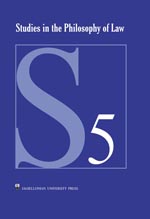Human Genetic Engineering and the Problems
Human Genetic Engineering and the Problems
Author(s): Michał AraszkiewiczSubject(s): Law, Constitution, Jurisprudence
Published by: Wydawnictwo Uniwersytetu Jagiellońskiego
Keywords: law; philosophy of law; law and biology; biojurisprudence; legal ethics;
Summary/Abstract: Many people nowadays do not consider the problem of the ethical implications of human genetic engineering (hereafter: HGE) a serious subject of discussion. There are both theoretical and practical reasons for adopting this sceptical attitude. As far as the former are concerned, our present knowledge of HGE is very modest: we cannot be sure what the limits of possible genetic transformations of human beings are and of the consequences of these transformations. Hence, it may be claimed that the whole debate has more in common with mere speculation rather than with a serious discussion based on fi rm scientifi c evidence. The practical objection concerns the possible benefi ts of engaging in this discussion. It is often claimed that moral and social philosophers should deal with more urgent, and undoubtedly more ‘tangible’ problems, like the fair distribution of medical services in general, sexual discrimination, taxation etc. Being aware of the two aforementioned problems, we must acknowledge the fact that there is a fierce ethical debate on HGE. A wide spectrum of views on HGE has been developed: from the so-called radical trans-humanists to radical bio-conservatives. The mere fact of there being a debate on a subject is not a suffi cient reason for treating this subject seriously. Nevertheless, I think that the discussion mentioned here is not without value. In consequence, the present paper has several aims. First, I would like to present the main theses raised in the context of the debate. In this respect, the following text may be seen as a kind of introduction to the moral problems of HGE. Second, I attempt to sketch a ‘map’ of distributive justice problems related to the development of HGE. I think these issues are worth discussing mainly for the following reason: the possibility of HGE poses moral challenges structurally different from the ones yielded by traditional social-moral issues. I will therefore try to elucidate these differences. The aim of the third part of the paper is to look at the discussed problem from the perspective of the Rawlsian theory of distributive justice. It is not a mainstream approach to the discussed issue, while it is typically analyzed from the perspective of human rights doctrine. I present and criticize the positions advanced by two prominent bioethicists, David Resnik and Colin Farrelly. Finally, some conclusions and perspectives for further research are formulated.
Journal: Studies in the Philosophy of Law
- Issue Year: 2010
- Issue No: 5
- Page Range: 29-43
- Page Count: 15
- Language: English

